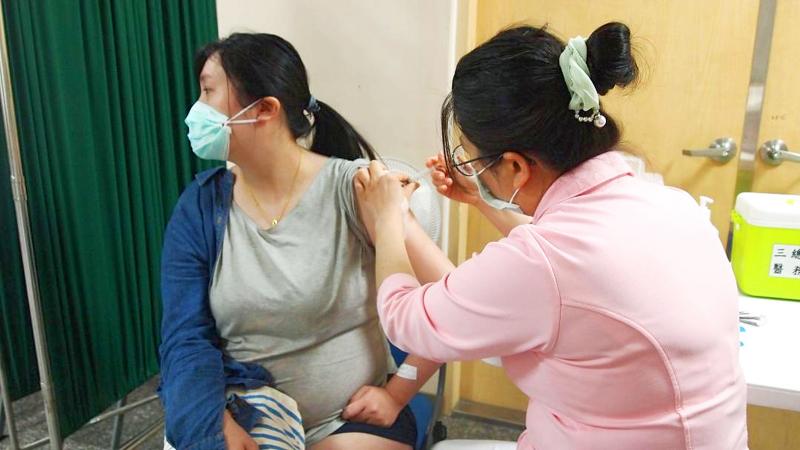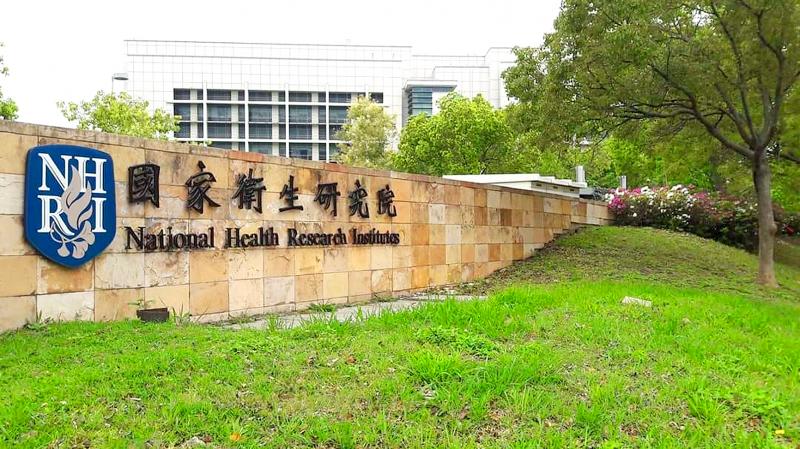The National Health Research Institutes is reportedly preparing to initiate talks with Moderna Inc for authorization to manufacture its COVID-19 vaccine in Taiwan, a local magazine said yesterday.
If successful, Taiwan would be able to manufacture anywhere between 300 million and 500 million doses within six to nine months, the Chinese-language Mirror Media said.
The institute has its eye on manufacturing messenger ribonucleic acid (mRNA) vaccines for its second vaccine plant expansion project, Liu Chia-chyi (劉家齊), a researcher at the institute’s vaccine research and development center, told a news conference yesterday.

Photo: Liu Yu-ching, Taipei Times
Speaking at a news conference yesterday, Liu said that the planned second vaccine manufacturing plant would include hardware that would be capable of manufacturing mRNA vaccines once Taiwan obtains the know-how.
Obtaining the knowledge to manufacture mRNA vaccines is critical, as mRNA vaccines are the go-to solutions for the “100-day mission” discussed by G7 leaders earlier this month to prepare for future pandemics, he said.
However, while mRNA vaccines are the new trend for combating the COVID-19 pandemic, it remains to be seen whether they can produce long-lasting antibodies in the human body, he added.

Photo: Cheng Ming-hsiang, Taipei Times
Taiwanese companies developing COVID-19 vaccines are focused on protein subunit vaccines, a low-risk technology that Taiwan already possesses, he said.
“Safe and effective vaccines are what we should aim for,” he said.
Chang Gung University Research Center for Emerging Viral Infections professor Shih Shin-ru (施信如) said mRNA vaccines are the quickest to research and develop.
Foreign countries are trending toward using mRNA vaccines as the first shot, while using protein subunit vaccines as the second shot to increase immunity in the human body, she said.
Shih said the institute should conduct extended research on existing subunit vaccines while simultaneously obtaining key knowledge in manufacturing mRNA vaccines.
Separately, the institute said that the Food and Drug Administration and the Ministry of Economic Affairs are tallying what resources Taiwan could bring to bear before official talks with Moderna can commence.
Regardless of which company Taiwan works with, they would want to know that the nation would be able to produce a guaranteed amount of vaccines, institute president Liang Kung-yi (梁賡義) said.
Liang sidestepped the question of whether it was possible to manufacture 300 million to 500 million doses within a six-to-nine-month time frame, saying: “The important thing is whether we have the ability to make them.”
Minister of Health and Welfare Chen Shih-chung (陳時中), who heads the Central Epidemic Command Center, said the government would try its best to obtain authorization to manufacture foreign COVID-19 vaccines, but added that to date, such negotiations have yet to bear fruit.
The plan is to finish the second vaccine manufacturing plant within three years and obtain a Good Manufacturing Practice certificate with one to one-and-a-half years, Liang said.
Additional reporting by Wu Liang-yi

US President Donald Trump yesterday announced sweeping "reciprocal tariffs" on US trading partners, including a 32 percent tax on goods from Taiwan that is set to take effect on Wednesday. At a Rose Garden event, Trump declared a 10 percent baseline tax on imports from all countries, with the White House saying it would take effect on Saturday. Countries with larger trade surpluses with the US would face higher duties beginning on Wednesday, including Taiwan (32 percent), China (34 percent), Japan (24 percent), South Korea (25 percent), Vietnam (46 percent) and Thailand (36 percent). Canada and Mexico, the two largest US trading

AIR SUPPORT: The Ministry of National Defense thanked the US for the delivery, adding that it was an indicator of the White House’s commitment to the Taiwan Relations Act Deputy Minister of National Defense Po Horng-huei (柏鴻輝) and Representative to the US Alexander Yui on Friday attended a delivery ceremony for the first of Taiwan’s long-awaited 66 F-16C/D Block 70 jets at a Lockheed Martin Corp factory in Greenville, South Carolina. “We are so proud to be the global home of the F-16 and to support Taiwan’s air defense capabilities,” US Representative William Timmons wrote on X, alongside a photograph of Taiwanese and US officials at the event. The F-16C/D Block 70 jets Taiwan ordered have the same capabilities as aircraft that had been upgraded to F-16Vs. The batch of Lockheed Martin

GRIDLOCK: The National Fire Agency’s Special Search and Rescue team is on standby to travel to the countries to help out with the rescue effort A powerful earthquake rocked Myanmar and neighboring Thailand yesterday, killing at least three people in Bangkok and burying dozens when a high-rise building under construction collapsed. Footage shared on social media from Myanmar’s second-largest city showed widespread destruction, raising fears that many were trapped under the rubble or killed. The magnitude 7.7 earthquake, with an epicenter near Mandalay in Myanmar, struck at midday and was followed by a strong magnitude 6.4 aftershock. The extent of death, injury and destruction — especially in Myanmar, which is embroiled in a civil war and where information is tightly controlled at the best of times —

China's military today said it began joint army, navy and rocket force exercises around Taiwan to "serve as a stern warning and powerful deterrent against Taiwanese independence," calling President William Lai (賴清德) a "parasite." The exercises come after Lai called Beijing a "foreign hostile force" last month. More than 10 Chinese military ships approached close to Taiwan's 24 nautical mile (44.4km) contiguous zone this morning and Taiwan sent its own warships to respond, two senior Taiwanese officials said. Taiwan has not yet detected any live fire by the Chinese military so far, one of the officials said. The drills took place after US Secretary